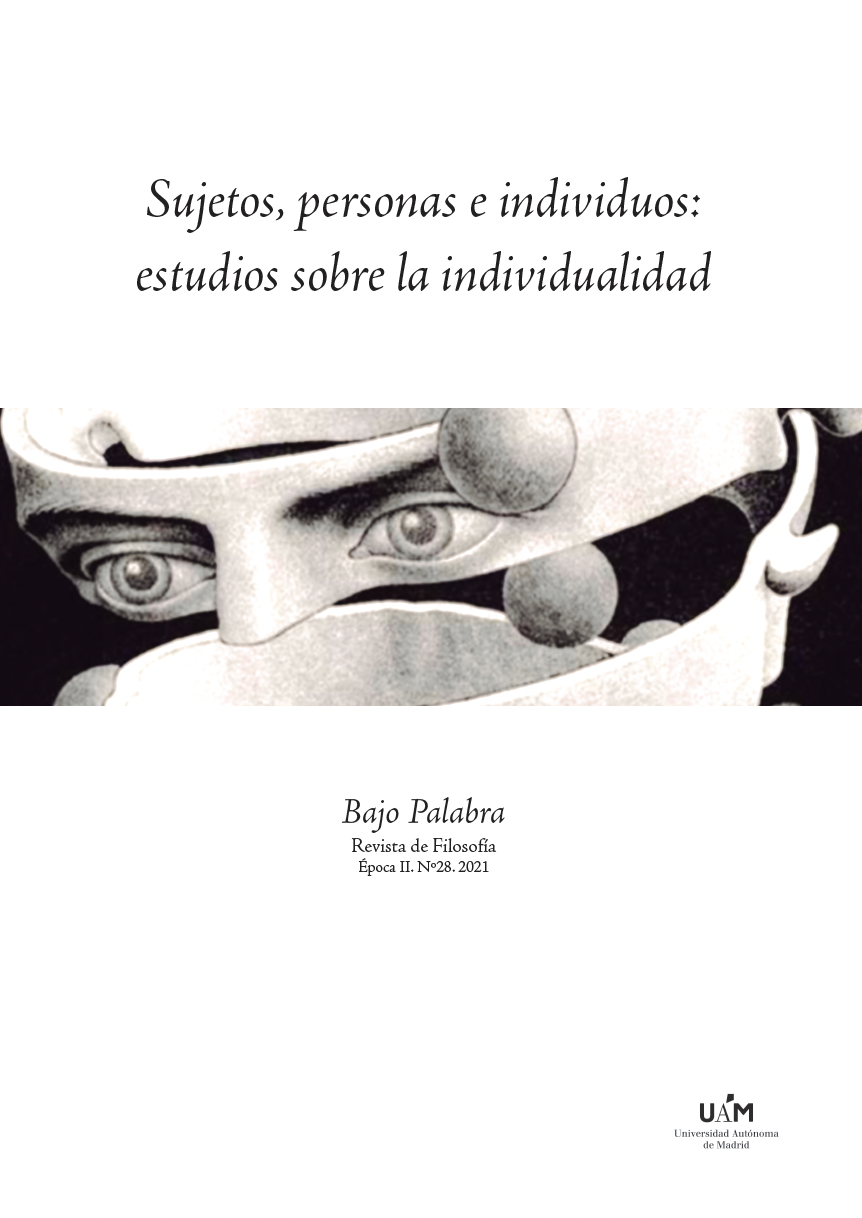Keywords:
minimal self, phenomenology, identity theories, personality, old ageCopyright (c) 2021 Agata Joanna B?k

This work is licensed under a Creative Commons Attribution 4.0 International License.
Abstract
This paper focuses on the relevance that
the notion of minimal self, as proposed e.g.
by Zahavi, for a phenomenological theory of
identity. I will do so by analyzing the phenomenon
of coming of age. Firstly, I characterize
the notion of minimal self as expressed in Zahavi’s
claims with a view to analyzing premises
and arguments on which it is grounded.
Nevertheless, secondly, defending minimal
self might pose challenges when it comes to
characterize certain life experiences that seem
to be constituted intersubjectively. In particular,
phenomena such as illness, age or gender
are not exclusively constituted in individual,
solitary experience, but rather they can only
be ultimately understood by the very subject
in intersubjective perspective. The argument I
offer in the third step of my exposition, is the
description of advanced age in terms of personal
discovery of being old, drawing mainly on
Simone de Beauvoir’s writings.
Downloads
References
Aurenque Stephan, D. (2020). Fenomenología de la vejez y el cuerpo como anclaje
al tiempo: “Se debe ser viejo para reconocer lo breve que es la vida”, Valenciana,
(27), 2021, 147-168. DOI: https://doi.org/10.15174/rv.v13i27.479
Behnke, E. (1997). Ghost Gestures: Phenomenological Investigations of Bodily
Micromovements and Their Intercorporeal Implications. Human Studies 20,
, pp. 181–201. DOI: https://doi.org /10.1023/a:1005372501258
Behnke, E. (2016). La vida operativa: the transcendental disclosure of operatively
functioning life. Acta Mexicana De Fenomenología, 1, 2016, pp. 29-48.
De Beauvoir, S. (1996). The coming of age. W. W. Norton & Company.
Brudzinska J. (2014). Becoming a Person in a Life-World, Paradigmi. Rivista
di critica filosofica, 3, 2014, pp. 91-110. DOI: https://doi.org/10.3280/
PARA2014-003007
Fuchs, Th. (2017). Self across time: the diachronic unity of bodily existence,
Phenom. Cogn Sci, 16, pp. 291-315 DOI: https://doi.org/10.1007/s11097-015-
-4
Heinämaa, S. (2014). Transformations of Old Age. Selfhood, Normativity, and
Time, en S. Stoller (ed.) Simone de Beauvoir’s Philosophy of Age. De Gruyter,
, pp. 167-187.
Heinämaa, S. y Jardine, J. (2021). Objetivación, inferiorización y proyección en la investigación
fenomenológica acerca de la deshumanización, en A. Bak, (ed.) Las fronteras
del sentido. Filosofía y crítica de la violencia. UAEMEX/Sb Editorial, pp. 15-40.
Husserl, E. (2005). Ideas para una fenomenología pura y una filosofía fenomenológica.
Libro Segundo: Investigaciones fenomenológicas sobre la constitución. Fondo
de Cultura Económica.
Husserl, E. (2008), La crisis de las ciencias europeas y la fenomenología trascendental.
Prometeo.
Husserl, E. (2013). Ideas relativas a una fenomenología pura y una filosofía fenomenológica.
Libro primero: Introducción general a una fenomenología pura. Fondo
de Cultura Económica.
Kriegel, U. (2004). Consciousness and Self-Consciousness, Monist, 87 (2), 182-
DOI: https://doi.org/10.5840/monist20048725
Parnas, J. y Sass, L. A. (2001). Self, Solipsism, and Schizophrenic Delusions,
Philosophy, Psychiatry, & Psychology, 8 (2/3), 2001, pp. 101-120. DOI: https://
doi.org/10.1353/ppp.2001.0014
Ratcliffe, M. (2017a). Real Hallucinations: Psychiatric Illness, Intentionality, and
the Interpersonal World. The MIT Press.
Ratcliffe, M. (2017b). Selfhood, Schizophrenia, and the Interpersonal Regulation
of Experience en Durt, Fuchs y Tewes (eds.) Embodiment, enaction and
culture. Investigating the constitution of the Shared World. The MIT Press.
Stoller, S. (ed.) (2014). Simone de Beauvoir’s Philosophy of Age. Gender, Ethics and
Time. Gruyter.
Schweda, M., Coors, M. y Bozzaro, C. (eds.) (2020). Aging and Human Nature.
Perspectives from Philosophical, Theological, and Historical Anthropology, Springer.
Venebra, M. (en prensa). El tiempo del cuerpo. La vejez. Fenomenología de la
fragilidad y el desgaste, aceptado para publicación en Areté.
Wehrle, M. (2020). Becoming Old. The Gendered Body and the Experience of
Aging, en Schweda, Coors y Bozzaro (eds.) Aging and Human Nature. Perspectives
from Philosophical, Theological, and Historical Anthropology. Springer, pp. 75-95.
Zahavi D. (1999). Self-awareness and Alterity. A Phenomenological Investigation,
Nortwestern University Press.
Zahavi, D. (2017). Thin, Thinner, Thinniest: Defining the Minimal Self, en
Durt, Fuchs y Tewes (eds.) Embodiment, enaction and culture. Investigating the
constitution of the Shared World. The MIT Press, pp. 193-200.
Zahavi, D. (2018). Consciousness, Self-Consciousness, Selfhood: a Reply to
some Critics, Rev. Phil. Psych. 9, 703-718, 2018. DOI: https://doi.org/10.1007/
s13164-018-0403-6
Zahavi, D. (2019a). Consciousness and (minimal) selfhood: Getting clearer on
for-me-ness and mineness, en Kriegel (ed.) The Oxford Handbook of the Philosophy
of Consciousness. Oxford University Press, pp. 635-653.
Zahavi, D. (2019b). Getting it quite wrong. Van Manen and Smith on Phenomenology,
Qualitative Health Research, 29 (6), 2019, pp. 900-907. DOI: https://
doi.org/10.1177/1049732318817547
Zahavi, D. (2020). Locked-In Syndrome: a Challenge to Standard Accounts of
Selfhood and Personhood? Neuroethics 13, pp. 221–228. DOI: https://doi.
org/10.1007/s12152-019-09405-8

